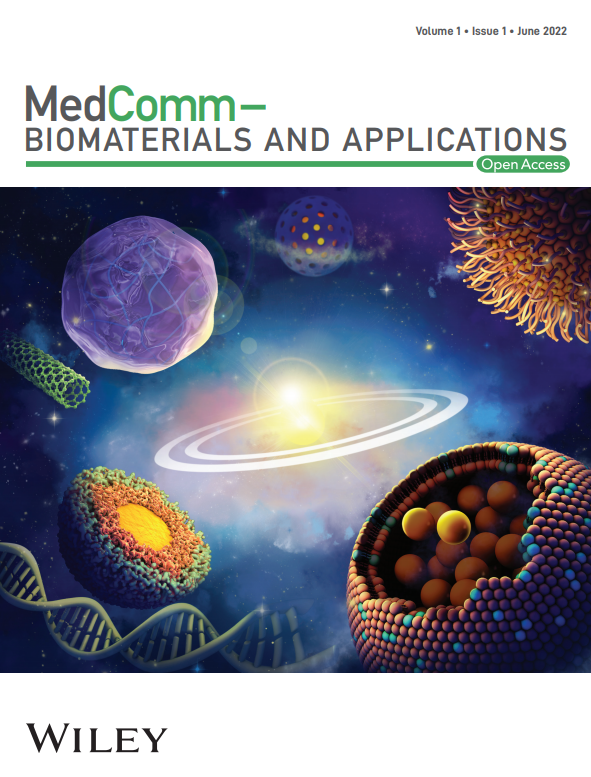
Journal
- MedComm Introduction
- Molecular Biomedicine Introduction
- Signal Transduction and Targeted Therapy Introduction
- MedComm-Future Medicine | Artificial Intelligence in Medical Education: A Practical Guide for Educators
- MedComm-Biomaterials and Applications | Platelets: Novel Biomaterials for Cancer Diagnosis and Therapeutic Delivery
Editors-in-Chief:
Carlo M.Croce
Prof. Kang Zhang
Yu-quan Wei

Editors-in-Chief:
James H.Naisimth
Günter P. Wagner
Yu-quan Wei

Editors-in-Chief:
Arnold J.M.Driessen
Yu-quan Wei

Editors-in-Chief:
Robin Ali
Michael Karin
Kang Zhang

Editors-in-Chief:
Mohan Edirisinghe
Zhiyong Qian

Editors-in-Chief:
Guido Kroemer
Yong Peng

Journal
- MedComm Introduction
- Molecular Biomedicine Introduction
- Signal Transduction and Targeted Therapy Introduction
- MedComm-Future Medicine | Artificial Intelligence in Medical Education: A Practical Guide for Educators
- MedComm-Biomaterials and Applications | Platelets: Novel Biomaterials for Cancer Diagnosis and Therapeutic Delivery
Editors-in-Chief:
Carlo M.Croce
Prof. Kang Zhang
Yu-quan Wei

Editors-in-Chief:
James H.Naisimth
Günter P. Wagner
Yu-quan Wei

Editors-in-Chief:
Arnold J.M.Driessen
Yu-quan Wei

Editors-in-Chief:
Robin Ali
Michael Karin
Kang Zhang

Editors-in-Chief:
Mohan Edirisinghe
Zhiyong Qian

Editors-in-Chief:
Guido Kroemer
Yong Peng

Liver function reserve (LFR) plays an extensive and important role in patients with liver disease. Indocyanine green (ICG) clearance test is the standard diagnostic approach for LFR evaluation which was performed by spectrophotometry or pulse dye densitometry (PDD). Spectrophotometry is the gold standard, it's invasive and not real-time. PDD is non-invasive, but accuracy of PDD is controversial. Taken spectrophotometry as the reference standard, this study investigated the accuracy of photoacoustic imaging (PAI) method for LFR assessment and compared to PDD in healthy volunteers. The results demonstrated a strong correlation between PAI method and spectrophotometry (r = 0.9649, p < 0.0001). No significant difference was shown in ICG clearance between PAI and spectrophotometry method (rate constant k1 vs. k2, 0.001158 +−0.00042 vs. 0.001491 +- 0.00045, p = 0.0727; half-life t1 vs. t2, 601.2 s vs. 474.4 s, p = 0.1450). These results indicated that PAI may be valuable as a noninvasive, accurate diagnostic tool for LFR assessment in human.
2023-05-31
Photoacoustics
West China Hospital, Sichuan University
The outer membrane structure is common in Gram-negative bacteria, mitochondria and chloroplasts, and contains outer membrane β-barrel proteins (OMPs) that are essential interchange portals of materials1,2,3. All known OMPs share the antiparallel β-strand topology4, implicating a common evolutionary origin and conserved folding mechanism. Models have been proposed for bacterial β-barrel assembly machinery (BAM) to initiate OMP folding5,6; however, mechanisms by which BAM proceeds to complete OMP assembly remain unclear. Here we report intermediate structures of BAM assembling an OMP substrate, EspP, demonstrating sequential conformational dynamics of BAM during the late stages of OMP assembly, which is further supported by molecular dynamics simulations. Mutagenic in vitro and in vivo assembly assays reveal functional residues of BamA and EspP for barrel hybridization, closure and release. Our work provides novel insights into the common mechanism of OMP assembly.
2023-04-30
Nature
West China Hospital, Sichuan University














